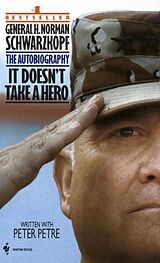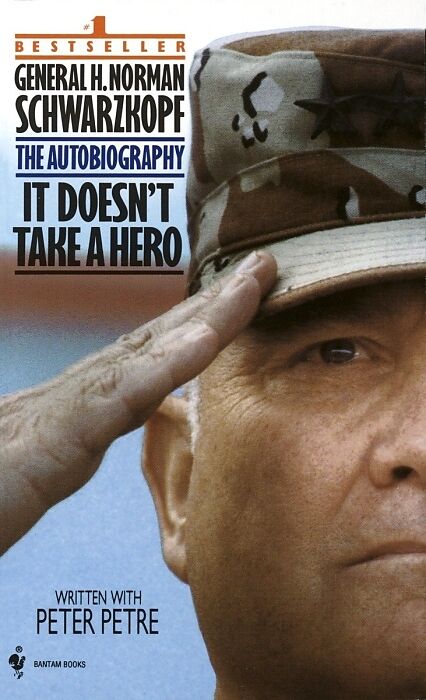It Doesn't Take a Hero
Einband:
Poche format A
EAN:
9780553563382
Untertitel:
Autobiography
Genre:
Geschichte
Autor:
N. ;Petre, P. Schwarzkopf
Herausgeber:
Bantam Books
Anzahl Seiten:
625
Erscheinungsdatum:
01.09.1993
ISBN:
0553563386
Zusatztext "Remarkably emotional... a gripping book."-- The New York Times Book Review . "A fine and lucid book! teeming with vitality... Schwarzkopf is a compelling storyteller.-- Los Angeles Times . "A must-read... a riveting reminder that one man can influence major events."-- Detroit Free Press . "An excellent book by an excellent man."-- The Wall Street Journal Informationen zum Autor Norman Schwarzkopf (19342012) was commander of the Allied Forces in the Gulf War. Klappentext He set his star by a simple motto: duty, honor, country. Only rarely does history grant a single individual the ability, personal charisma, moral force, and intelligence to command the respect, admiration, and affection of an entire nation. But such a man is General H. Norman Schwarzkopf, commander of the Allied Forces in the Gulf War. Now, in this refreshingly candid and typically outspoken autobiography, General Schwarzkopf reviews his remarkable life and career: the events, the adventures, and the emotions that molded the character and shaped the beliefs of this uniquely distinguished American leader. Zusammenfassung He set his star by a simple motto: duty! honor! country. Only rarely does history grant a single individual the ability! personal charisma! moral force! and intelligence to command the respect! admiration! and affection of an entire nation. But such a man is General H. Norman Schwarzkopf! commander of the Allied Forces in the Gulf War. Now! in this refreshingly candid and typically outspoken autobiography! General Schwarzkopf reviews his remarkable life and career: the events! the adventures! and the emotions that molded the character and shaped the beliefs of this uniquely distinguished American leader.
"Remarkably emotional... a gripping book."--The New York Times Book Review.
"A fine and lucid book, teeming with vitality... Schwarzkopf is a compelling storyteller.--Los Angeles Times.
"A must-read... a riveting reminder that one man can influence major events."--Detroit Free Press.
"An excellent book by an excellent man."--The Wall Street Journal
Autorentext
Norman Schwarzkopf (1934–2012) was commander of the Allied Forces in the Gulf War.
Klappentext
He set his star by a simple motto: duty, honor, country. Only rarely does history grant a single individual the ability, personal charisma, moral force, and intelligence to command the respect, admiration, and affection of an entire nation. But such a man is General H. Norman Schwarzkopf, commander of the Allied Forces in the Gulf War. Now, in this refreshingly candid and typically outspoken autobiography, General Schwarzkopf reviews his remarkable life and career: the events, the adventures, and the emotions that molded the character and shaped the beliefs of this uniquely distinguished American leader.
Zusammenfassung
He set his star by a simple motto: duty, honor, country. Only rarely does history grant a single individual the ability, personal charisma, moral force, and intelligence to command the respect, admiration, and affection of an entire nation. But such a man is General H. Norman Schwarzkopf, commander of the Allied Forces in the Gulf War. Now, in this refreshingly candid and typically outspoken autobiography, General Schwarzkopf reviews his remarkable life and career: the events, the adventures, and the emotions that molded the character and shaped the beliefs of this uniquely distinguished American leader.
Leseprobe
1
When my father went off to war in August 1942, his last act was to make me the man of the house. I was with him and my mother in the backyard, which to me always seemed like a magical place, with tall evergreen shrubs and fragrant lilacs and a mysterious old stone barbecue shaped like a throne. It was dusk and the first few fireflies were out; my older sisters, Ruth Ann and Sally, were busy inside the house. I was seven years old.
Pop stood in front of me and gave a little talk about how he had to leave because he was going off to serve our country. Because he was leaving, he said, I was now going to have a big job. It was up to me to look after the girls, because men are the protectors of women. He said he had great confidence in my ability to do this, and as a demonstration of his confidence, there was something he wanted me to have. Then he went into the house while I waited with Mom. When he came back out, he was carrying his Army saber. “I’m placing this sword in your keeping until I come back,” he said, and laid it in my hands. “Now, son, I’m depending on you. The responsibility is yours.”
My father’s saber was a sacred thing in our family. We called it his West Point sword, because he’d gotten it the year he graduated, in 1917. He was always quick to tell you that West Point had shaped his entire life. “Duty, Honor, Country,” the West Point motto, was his creed, and it became mine. He kept the saber on a table in his study, and when I was a tiny boy he would sometimes pull it from its scabbard and show me where his name was engraved on the blade. (It actually said N. Norman Schwarzkopf, because the engraver had made a mistake, but that didn’t matter.) The sword had special meaning for me because it was my name, too, and because from the first day I could remember, my parents had told me I was going to West Point. My sisters didn’t like it a bit, because girls were left out. But there was never any question about what my role was going to be.
When he handed me the saber I felt an awesome obligation. To be accountable not only for it, but for Mom and the girls! I was overwhelmed. My mother I thought I could handle. It was my sisters I was more worried about, since I had no control over anything my sisters did.
Mom made sure I put the saber back in its place in the study. Then it was time for bed. My mother was a registered nurse and always insisted we get our sleep. Pop kissed me one last good-night, and I lay looking out the window. It was still twilight, and I watched the stars start to come out. I fell asleep thinking, “How am I going to do this?”
The next morning when I woke up, my father was gone. Nothing was ever the same again.
Up to then I’d had a wonderful boyhood, filled with dogs, Christmases, birthdays, tree climbing and sled riding, and all kinds of friends. Despite the Depression, we had plenty of food on the table; the most we ever saw of hard times were the tramps who would show up at the back door. Mom would have our maid give them lunch, but when they’d eaten, they had to leave immediately.
We lived in a great stone fortress known as the Green House, on Main Street in Lawrenceville, New Jersey. The walls were covered with ivy, and a plaque beside the door said “1815.” The house had previously been leased by the Lawrenceville School, an exclusive boys’ school whose practice fields stretched out behind an iron fence across the street. Princeton was six miles down the road to the left; Trenton, the state capital, was six miles to the right. We had a large front yard with a copper beech tree that reached all the way to the heavens, like Jack’s beanstalk. The year Pop left I carved my initials on the trunk. Next to the beech was a big Camperdown elm—a great climbing tree whose branches drooped in such a way that you could go up and be hidden in the leaves. Beyond the barbecue pit in back, my parents owned an acre of land where they’d …

Leider konnten wir für diesen Artikel keine Preise ermitteln ...
billigbuch.ch sucht jetzt für Sie die besten Angebote ...
Die aktuellen Verkaufspreise von 6 Onlineshops werden in Realtime abgefragt.
Sie können das gewünschte Produkt anschliessend direkt beim Anbieter Ihrer Wahl bestellen.
Loading...
Die aktuellen Verkaufspreise von 6 Onlineshops werden in Realtime abgefragt.
Sie können das gewünschte Produkt anschliessend direkt beim Anbieter Ihrer Wahl bestellen.
| # | Onlineshop | Preis CHF | Versand CHF | Total CHF | ||
|---|---|---|---|---|---|---|
| 1 | Seller | 0.00 | 0.00 | 0.00 |
